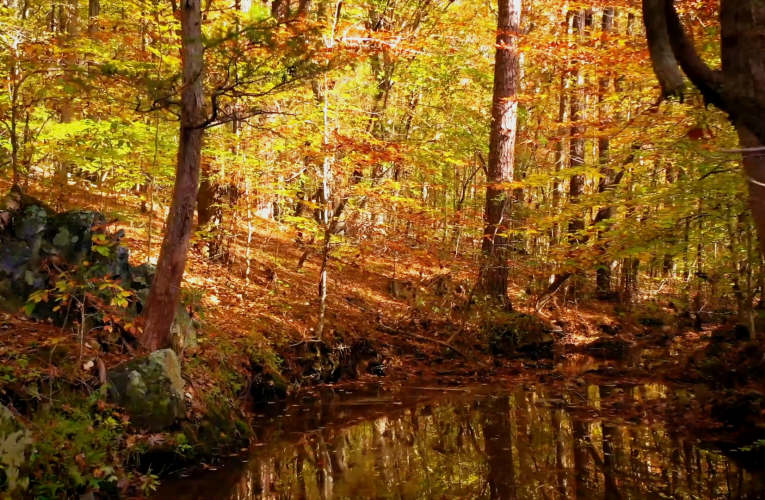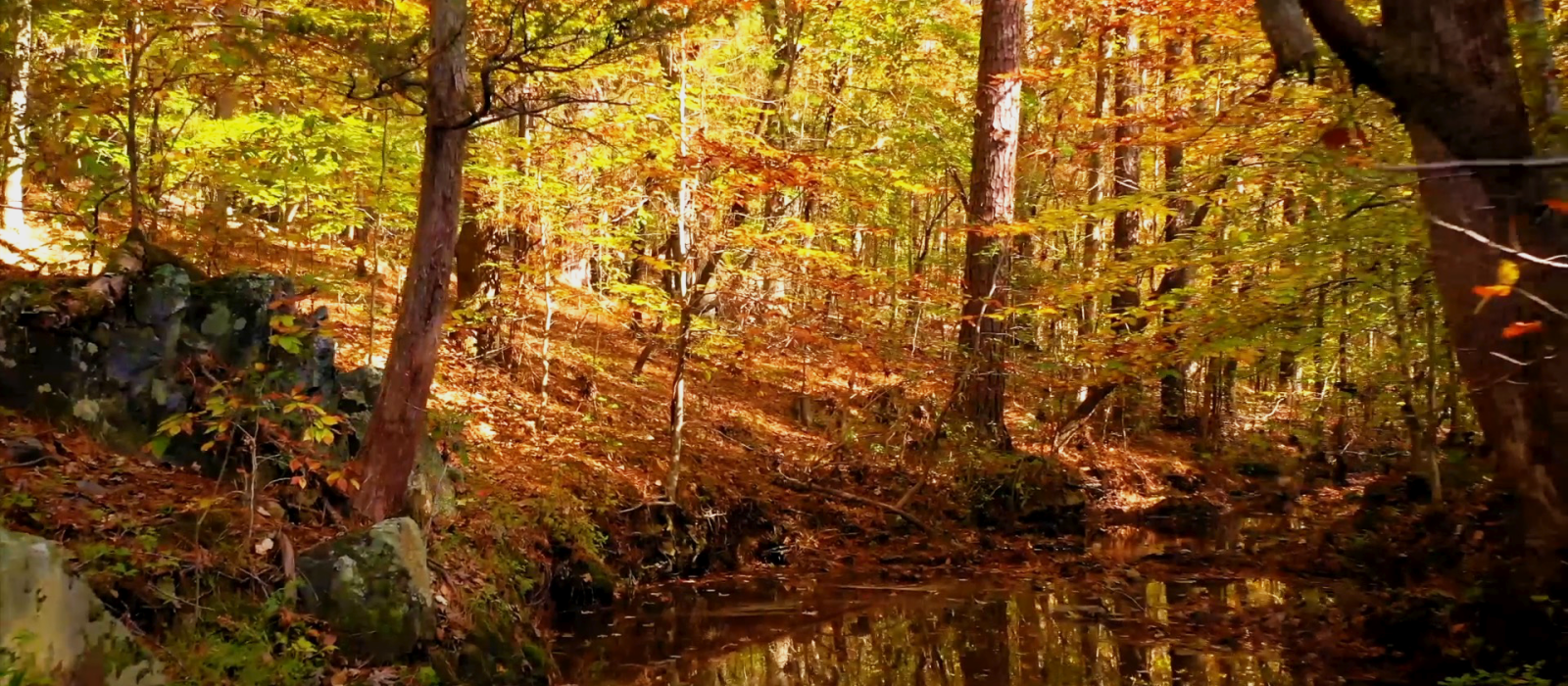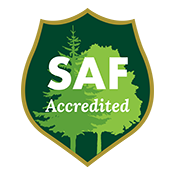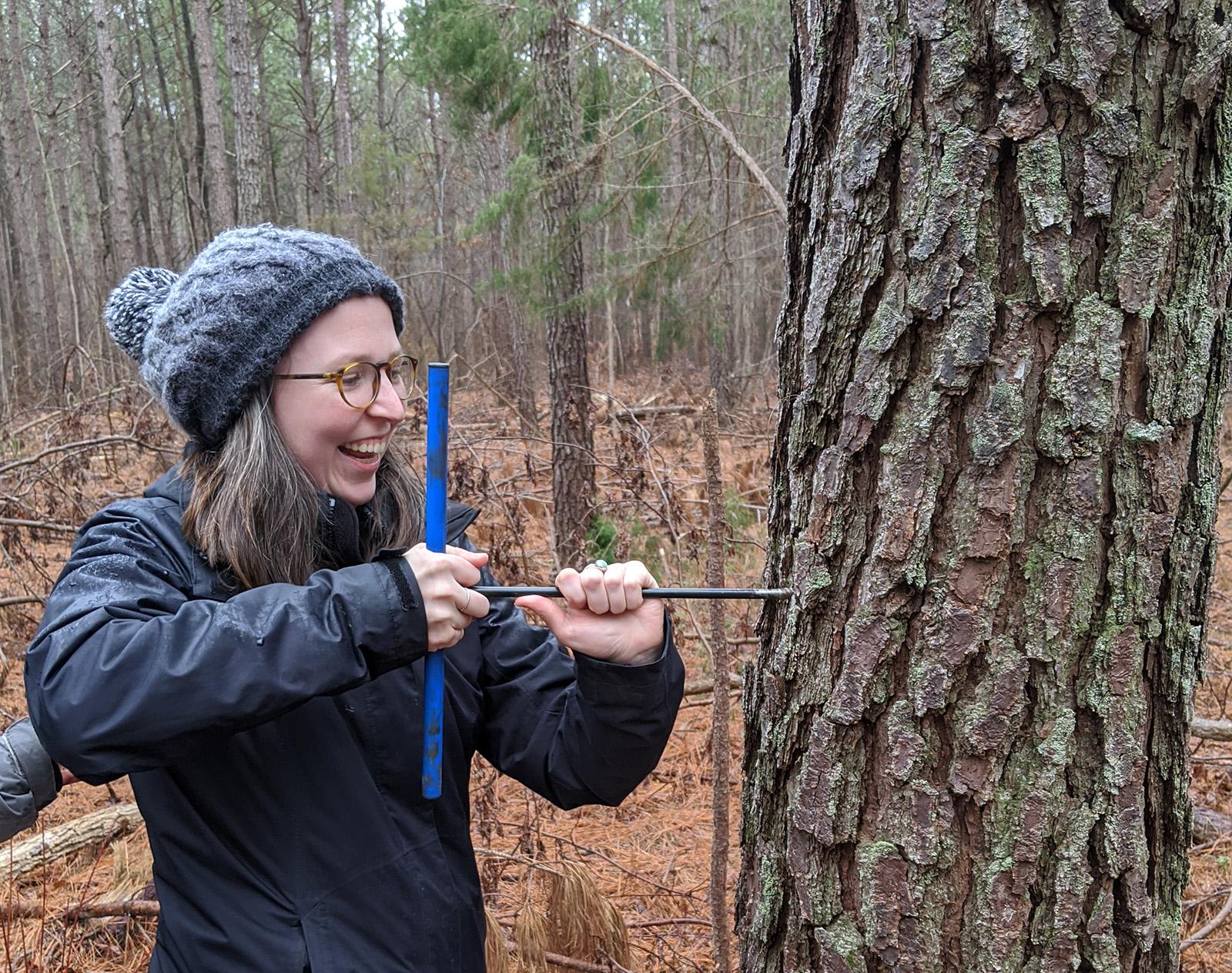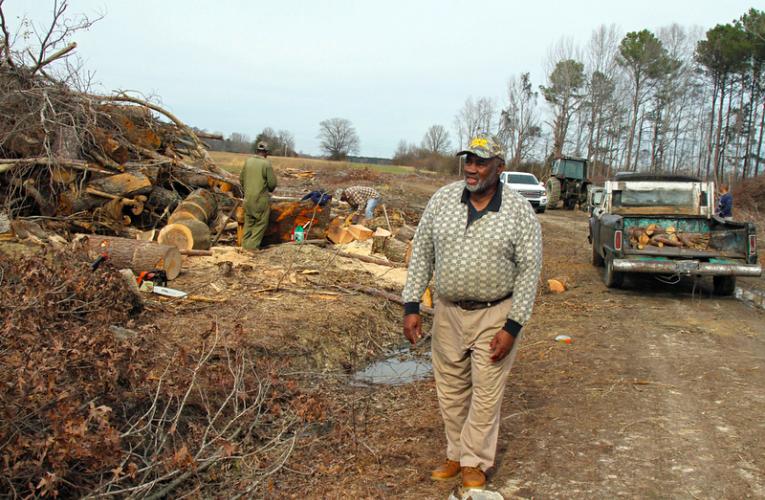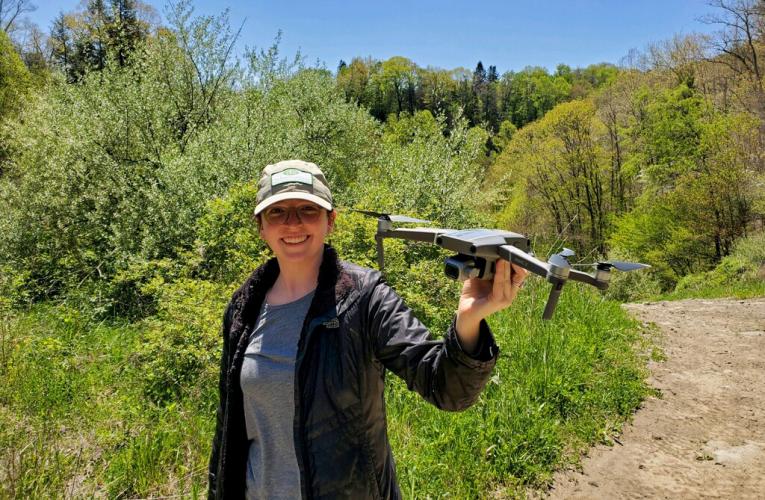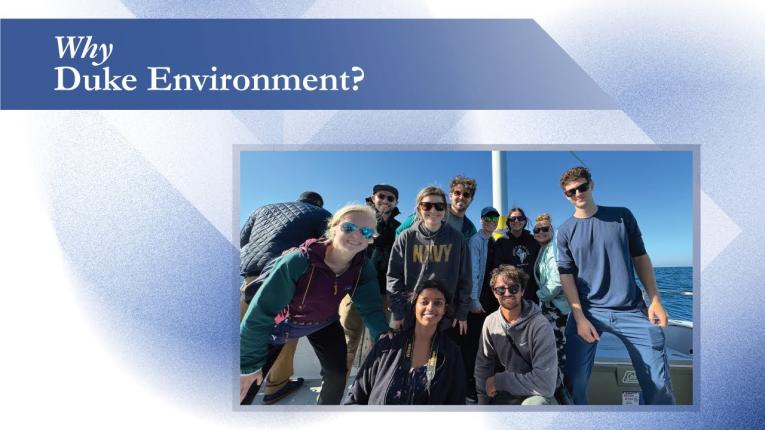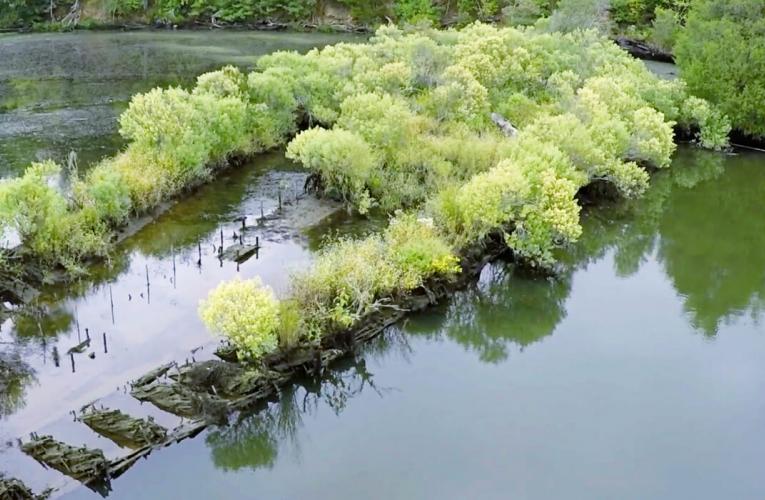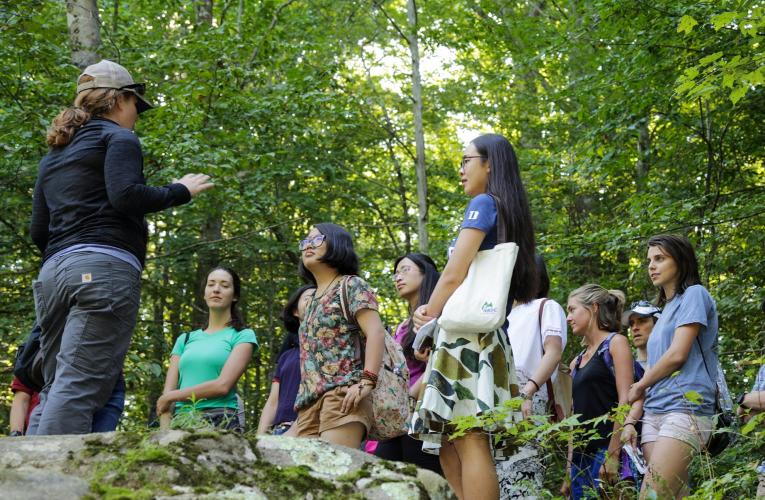Customize Your Curriculum
The MF curriculum includes coursework toward four core competencies: forest ecology and biology; measurement of forest resources; silviculture and management of forest resources; and forest resources policy, economics, and administration. Within these categories, students customize their course selections to emphasize particular resources (e.g., forest carbon, forest hydrology, biodiversity conservation) or analytic approaches (e.g., geospatial analysis, finance, environmental justice).
MF Credit Structure
Course credits are distributed among core competency areas specified by SAF, in addition to Nicholas School-wide requirements, quantitative analysis, and electives.
Specific to MF Students
- Competency Areas
- Forest Ecology & Biology: 6 credits
- Measurement of Forest Resources: 6 credits
- Silviculture & Management of Forest Resources: 10.5 credits
- Forest Resources Policy, Economics & Administration: 7.5 credits
- Quantitative Analysis: 6 credits
- Specializing Electives: 12 credits
- Trips and Additional Experiences
All MF and MEM Students
- Capstone requirement: MF students can complete either the MF Capstone Course (4 credits) or a Master's Project (4-6 credits). MF students who matriculate after Fall 2024 will be required to complete the MF Capstone Course but will retain an option to propose an MP.
- Seminar: 1 credit awarded at the end of 4 semesters
TOTAL: Minimum 48 credits required
When taken on its own, the MF program requires a total of at least 48 credits and four semesters of enrollment. A student pursuing the MF concurrently with the MEM will need at least five semesters of enrollment to earn the minimum of 72 credit hours and fulfill degree requirements. Rarely, six semesters might be needed to complete both degrees. Consult the concurrent degree requirements for additional information.
your master of forestry experience
Download the MF experience map (PDF) to see how you can combine your passions and interests in forestry to shape a graduate school experience focused on your future.
Course of Study
Prerequisites
Prerequisites for admission to the Nicholas School are:
- Some previous training in the natural sciences or the social sciences related to the student’s area of interest
- At least one semester of college calculus
- A college statistics course that includes descriptive statistics, probability distributions, hypothesis testing, confidence intervals, correlation, simple linear regression, and simple ANOVA.
Additional prerequisites for MF students are:
- At least 1 introductory college course in principles of ecology
- An introductory college economics course that includes microeconomics
Policies
-
Students are strongly encouraged to complete all prerequisites before matriculating into the program.
-
Deficiencies must be made up in the student’s first year in residence.
-
Prerequisites do not count toward degree requirements.
- More information is available in the Statement of Prerequisite Coursework.
Competency Areas
Competency areas include forest ecology and biology; measurement of forest resources; silviculture and management of forest resources; and forest resources policy, economics, and administration.
Courses taken to fulfill requirements other than those suggested here need advisor approval. (F) and (S) courses are usually offered in fall and spring semesters, respectively. An asterisk (*) indicates courses that are usually taught every other year.
Forest Ecology & Biology: 6 credits
- ENVIRON 503 Forest Ecosystems, 3 credits (S)
- One course from the options below:
- ENVIRON 505 Functional Ecology of Plants, 3 credits (F)
- ENVIRON 714 Landscape Ecology, 3 credits (F)
- ENVIRON 721 Soil Resources, 3 credits (F)
- ENVIRON 732 Hydrology in Environmental Management, 3 credits (F)
- ENVIRON 734L Watershed Hydrology, 3 credits (F)
Measurement of Forest Resources: 6 Credits
- ENVIRON 701 Forest Measurements, 3 credits (F)
- ENVIRON 731 Dendrology, 3 credits (F)
Silviculture & Management of Forest resources: 10.5 credits
- ENVIRON 705L Silviculture, 3 credits (S)
- ENVIRON xxx MF Capstone Course, 4 credits (F)
- ENVIRON 763 Forest Management Traveling Seminar, 1.5 credits (rotating topics; may be taken up to three times for credit). Either of two NCSU courses, FOR 514 or FOR 595, can replace ENVIRON 763.
- ENVIRON 806 Duke Forest Practicum, 2 credits (S)
Forest Resources Policy, Economics & Administration: 7.5 Credits
- ENVIRON 520 Resource and Environmental Economics I, 1.5 credits (F)
- ENVIRON 680 Economics of Forest Resources, 1.5 credits (F). NCSU’s course FOR 519 can replace ENVIRON 520 & 680.
- ENVIRON 727 Forests in the Public Interest, 1.5 credits (F) (may be taken up to 2 times for credit)
- One course from the options below:
- ENVIRON 550 Land Use Principles and Policies, 3 credits
- ENVIRON 577 Environmental Politics, 3 credits
- ENVIRON 835 Environmental Law, 3 credits
Quantitative Analysis: 6 Credits
- ENVIRON 710 Applied Statistical Modeling Environmental Management, 3 credits (S)
- One course from the options below, 3 credits:
- ENVIRON 558L Satellite Remote Sensing for Environmental Analysis
- ENVIRON 559 Fundamentals of Geospatial Analysis
- ENVIRON 724 Landscape Analysis and Management
- ENVIRON 761 Geospatial Analysis for Conservation & Management
- ENVIRON 796 Financial Foundations for Environmental Managers
- ENVIRON 832 Environmental Decision Analysis
- ENVIRON 859/A Geospatial Data Analytics
One or more courses focusing on geospatial analysis are highly recommended to satisfy the Quantitative Analysis requirement or as Specializing Electives (next section).
Quantitative courses are also taught by the Fuqua School of Business, Sanford School of Public Policy, and Duke’s Departments of Biology, Economics, Evolutionary Anthropology, Political Science, Sociology, and Statistical Science. In addition, various departments at NCSU and UNC offer graduate-level quantitative coursework that can be used to meet this requirement.
Specializing Electives
Electives provide students with an opportunity to develop a field of specialization within forestry. Students are encouraged to coordinate electives to develop specialized skills or a specialized understanding of, for instance, a specific forest ecosystem or area of practice. Such specialization allows students to acquire proficiency in some aspect of the broad, multi-disciplinary field of forest resource management.
Examples include forest carbon management, wetland ecology and management, hydrology and soil science, conservation ecology, GIS analysis, environmental justice, economics, finance, policy analysis, and business management.
The specialization can be further developed through a Master’s Project, if students choose to undertake one. Such students should familiarize themselves with the Master’s Project Handbook, especially the Additional MP Guidelines for Master of Forestry (MF) Students.
Selection of electives is done in consultation with the student’s advisor. The identification of a specialization is usually done over the course of a student’s first two semesters.
MF Seminar
ENVIRON 898.01 MF Seminar, 1 credit to be awarded at the end of four semesters (F, S)
As an MF student, you will take this course every semester. Even though you will have registered for this course in multiple semesters, you will earn only one credit towards your degree at graduation. Seminar activities include group course advising, professional development activities, two required Ethics sessions, one required Land Tenure session, and MP practice presentations.
Field Trips and Additional Experiences
- Forest Field Trip Courses
- All MFs are assured a place in ENVIRON 766A, Ecology of S. Appalachian Forests, a 1-credit readings and field trip course offered every other fall.
- A 1-credit Western Forestry Field Trip, ENVIRON 760A, is offered occasionally in the early or late summer.
- Duke Forest: 7,000-acre forest science teaching and research laboratory adjacent to Duke's campus
- Concurrent Degree Option - pursue the MF concurrently with the Nicholas School's Master of Environmental Management (MEM) or with degrees from other professional schools.
- Summer Internships and Experiences
- Career and Professional Development Workshops
- Certificate Programs
- Co-Curricular Opportunities
- Student Groups
Course Sequence
The following course sequence is suggested for students who are enrolled in the 2-year MF degree program on its own (not joint with the MEM or another professional degree). It assumes that students will complete the new MF Capstone Course and not an MP. Because the sequence is designed to progressively build up expertise, students in the concurrent MF/MEM degree program should follow it to the extent possible.
2-Year Course Sequence
Note that ENVIRON 727 and ENVIRON 763 may be taken more than once for credit.
Fall Year 1
- Program Area Seminar (ENV 898.01), 0 credits
- Forest Measurements (ENV 701), 3 credits
- Dendrology (ENV 731), 3 credits
- Resource & Env Econ I (ENV 520), 1.5 credit
- Econ of For Resources (ENV 680), 1.5 credits
- One additional required or elective course, 3 credits
- TOTAL: 12
Spring Year 2
- Program Area Seminar (ENV 898.01), 0 credits
- Forest Ecosystems (ENV 503), 3 credits
- Silviculture (ENV 705L), 3 credits
- Duke Forest Practicum (ENV 806), 2 credits
- Appl Data Anal for Environ Sci (ENV 710), 3 credits
- One additional required or elective course, 3 credits
- TOTAL: 14
Fall Year 2
- Program Area Seminar (ENV 898.01), 0 credits
- Forest Mgmt Traveling Seminar (ENV 763), 1.5 credits
- Forests in the Public Interest (ENV 727), 1.5 credits
- MF Capstone Course (ENV TBD), 4 credits
- Two additional required or elective courses, 6 credits
- TOTAL: 13
Spring Year 2
- Program Area Seminar (ENV 898.01), 1 credit
- Three additional required or elective courses, 9 credits
- TOTAL: 10 credits
GRAND TOTAL: 49 credits
Note: To meet MF degree requirements, students must use three of the seven unspecified course slots shown above to take at least 3 credits in Forest Ecology & Biology, at least 3 credits in Forest Policy & Administration, and at least 3 credits in Quantitative Analysis, in addition to the specific courses listed. They must complete at least 48 total credits, including electives.
Your Future
The Nicholas School’s dedicated Career & Professional Development Center helps MF graduates find positions with consulting firms and corporations, nonprofit organizations, and government agencies in forestry and related fields.
Most Recent Employer List for MF Graduates
BUSINESS / INDUSTRY / START-UP
- Anew Climate; Forest Carbon Analyst - Portland, OR
- Aurora Sustainable Lands; Operations & Portfolio Management Analyst+ - Undisclosed
- Aurora Sustainable Lands; Sustainability Forester**** - Undisclosed
- Eastwood Forests, LLC; Forest Operations Manager+ - Chapel Hill, NC
- Manulife Investment Management; Resource Planning Analyst**** - Boston, MA
- Upstream, LLC; Founder/Director**** - South Carolina
- Weyerhaeuser; Development Professional**** - Lynchburg, VA
CONSULTING
- RK&K; Environmental Scientist**** - Raleigh, NC
GOVERNMENT / PUBLIC SECTOR
- Colorado State University; Research Associate, Public Lands Policy Group**** - Fort Collins, CO
NGO / THINK TANK / RESEARCH INSTITUTE
- ACR at Winrock International; Technical Officer, Forestry**** - Undisclosed
- Durham Community Land Trustees, Inc.; Urban Conservation and Community Fellow**** - Durham, NC
* MEM or MF/MBA concurrent degree
** MEM/JD concurrent degree
*** MEM/MPP concurrent degree
**** MEM/MF concurrent degree
The 2024 Employment Data Report illustrates our students' paths after graduation. Statistics in the report represent December 2023 and May 2024 Master of Forestry graduates, with sections covering geographic distribution, work environment, employment by sector and salary ranges.
The exposure to real forestry practices through coursework, practicums, and internships were invaluable to being a dynamic professional in the forestry space. Additionally, the MEM helped give me a broader understanding of the economics and policy that influence environmental markets."
–Cakey Worthington, MEM/MF'16
director of forest carbon, the forestland group, llc
From Forestry Faculty
Forests are indispensable. They sustain local economies while providing environmental values ranging from mitigating climate change to protecting water quality and harboring biodiversity. Managing and conserving the world’s forest resources requires knowledge of biology, ecology, and economics, combined with skills in field measurements, silviculture, finance, and policy analysis. Duke’s Master of Forestry program trains students to apply an interdisciplinary approach to reconciling society’s many demands on forests and solving the complex challenges therein. Our students benefit from networking with our influential alumni, next-door access to the 7,000-acre Duke Forest, and participating in our innovative research programs and abundant internship opportunities.
Be Part of Something Bigger
At Duke Environment, you’ll find a customizable degree that gives you the skills, knowledge and networks needed to tackle today’s toughest environmental challenges and succeed in a career that creates real change—all while engaging you in a community of caring and conscious people who share your commitment to being part of the solution.
You don't have to wait until you graduate to start contributing to positive change in the world. As a professional master's student at Duke, you'll find abundant opportunities for immediate application of your learning through your Master's Project (MP), as well as internships, co-curricular activities and student groups.
Ready to Take the Next Step?
Connect with us at an upcoming event to meet our admissions team and gain in-depth information about our degree programs.
Visit the master's programs Admissions section to learn more about application requirements, find answers to frequently asked questions and start your application.
Come Change the World With Us
Related News
-
February 16, 2023
-
December 13, 2022
-
August 16, 2021
